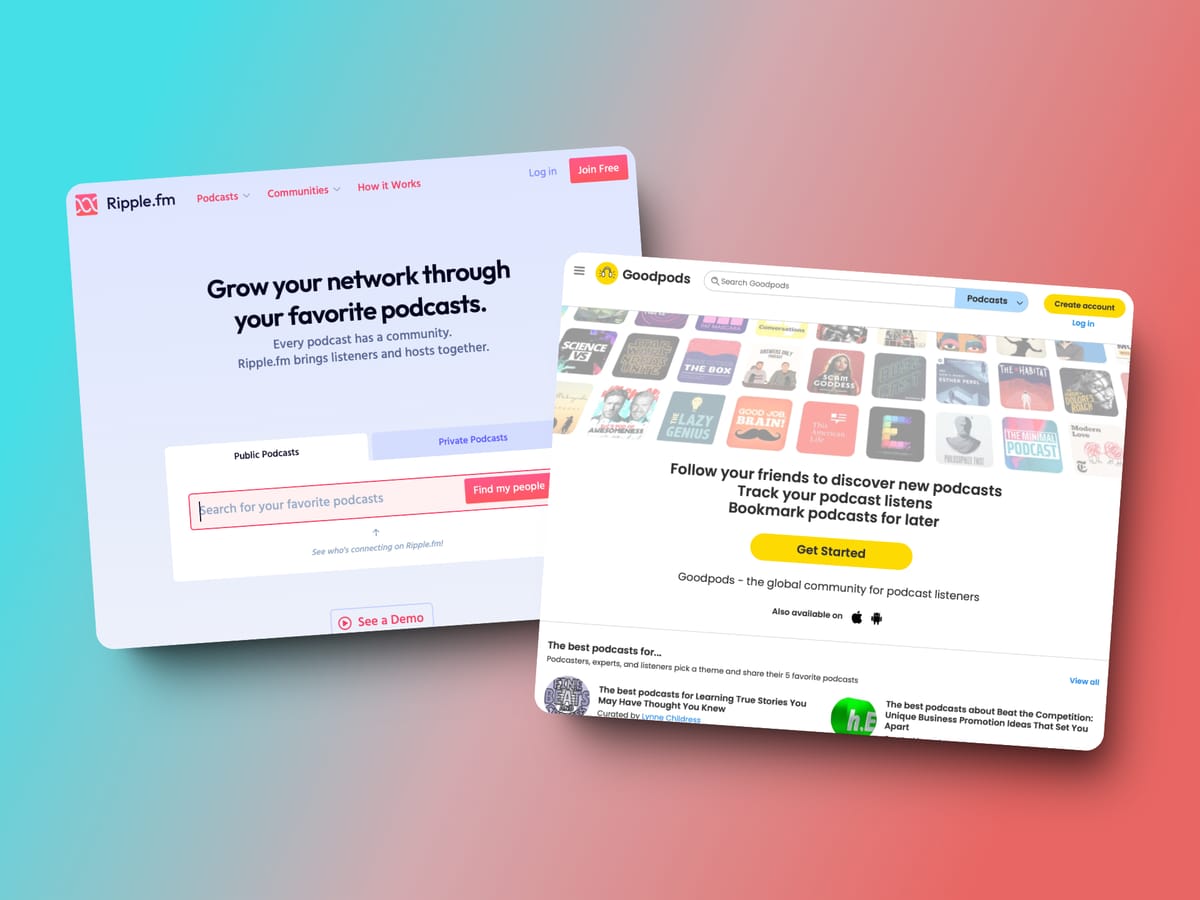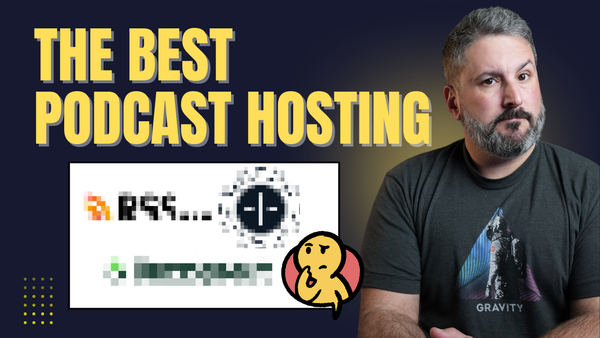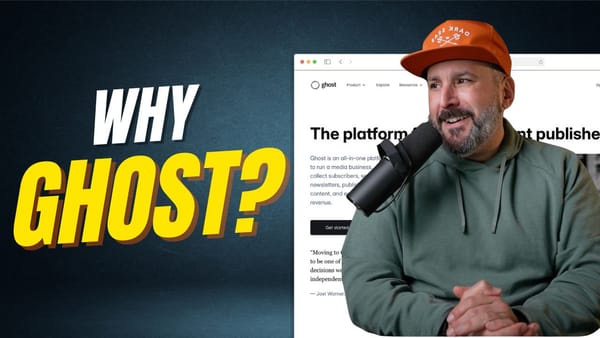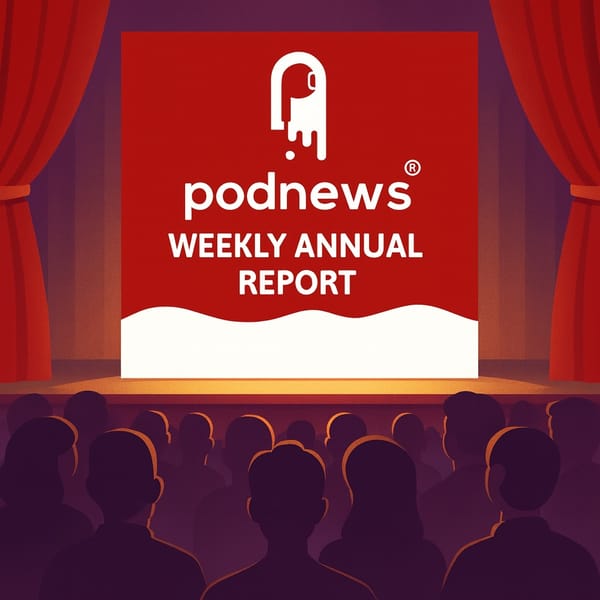Goodpods & Ripple.fm: Podcast Engagement with a Dash Of Community

Podcasters are thirsty for ways to grow their shows and build community around their work.
The elusive "up and to the right" on your podcast dashboard isn't something that comes easy. I'd also argue that it's not the most important metric for measuring success in your podcast journey.
The old guard will brush off growth hacks or social media promotion tricks, in favor of deeper relationships with the audience and urging you to tirelessly improve your craft. In my opinion, there's no right or wrong way in podcasting; do what suits you.
I like to be healthy — but damn, that pizza tastes good too!
Enter platforms like Goodpods (and a once forgotten Podchaser) that build community around podcasts, with the promise of more exposure for all of your efforts. It's like a social network with a "groups" feature.
While Goodpods is "just getting started," a new contender enters the ring: Ripple.fm. Let's take a look at some of the features these two apps go head-to-head on.
A bit of background
To be honest, I didn't think Goodpods was going to stay focused on the group and social aspects for too long.
I reviewed them shortly after they launched at my old Castos job.
My biggest criticism of Goodpods (at the time) was around my own uncertainty of their focus on the podcaster. When they launched, they touted some celebrities on the homepage like Kim Kardashian and other Hollywood-esque shows — ehhh, not this story again.
I'd have wagered they would go up-market to grapple with big advertising money, but they haven't sold out yet.
It's a mobile listening and engagement app, a web app, and a community builder all-in-one. It's tough to even compare Goodpods to Ripple.fm, as my good friend Brian Casel has just opened up the doors to the platform last week. To say it's in its infancy stage is an understatement.
Ripple does ship with community building aspects, like comments per episode, a search feature, and an interesting private podcast feature.
Let's explore the core features.
Podcast Community
Groups, community, chat, engagement, or whatever you want to call it.
The podcast world is fragmented, if not forgotten on this front. I'm not going to dive into the annals of Podcasting 2.0 in this article, but know that there are continuous improvements being developed to help standardize for app developers across the space.
Comments and groups were keystone features for Goodpods when it launched. Podchaser was on its way out, while Goodpods was filling that gap. New podcast apps are still scrambling to support this, while podcasters are left with only social networks for engagement.
Ripple.fm is also placing community building front and center with its ability to host comments on a per podcast basis.
Goodpods allows users to create their own groups that aren't necessarily attached to a podcast, but then gives users the ability to tag a podcast or a podcast episode within the group chat. Keeping in mind that Ripple.fm is still very early in the product cycle, I would like to see an episode tagging method.
The major advantage, aside from years of development, is that Goodpods is also a mobile listening app. While users are listening to your podcast, they can be communicating in the app. It's a nice touch.
Discoverability
Another elusive challenge for podcasters: getting found.
It's the double-edged sword of a largely open source & openly distributed industry. The beauty of RSS is that any number of podcast hosting companies can serve you, to distribute your podcast to anyone around the world, all relatively at low costs. The challenge is that there isn't one search engine or algorithm that can help a podcaster get found.
Most users are defaulting to searching on Apple Podcasts or Spotify because that's where they are already listening.
YouTube is making another effort for podcasters, but that isn't the savior podcasters are looking for.
The Podcast Index exists as a web front-end search for end users, with a back-end for app developers to tie into — but you still need the app to be popular.
One shared effort from both Goodpods and Ripple.fm is the ability to see followers of podcasts and the shows they are engaged with.
Your podcast growth will still largely come from word of mouth, so having a network-effect feature like this carries that social proof new listeners are looking for.
"If Jane likes The WP Minute WordPress News podcast, and I like WordPress, perhaps I'll follow the podcast too."
Again, Goodpods takes discoverability a step further by spanning across all aspects of the platform like People, Groups, and Podcasts.
Finding your Podcast's Home Base
At the end of the day, I think you should craft a precise strategy around leveraging either of these platforms respective of where you want to solidify your podcast's community.
Neither platform will give you a highly functional or customizable community platform, like if you were hosted on Circle or your own Slack/Discord group. Neither will allow you to take payments like if you were running your own Buy me a Coffee page. You don't "own the audience" as if you were grabbing email addresses for your ConvertKit newsletter.
Having said that, of all the alternatives I mentioned, neither are keeping the listener as close to the podcast listening experience as possible. Especially since Goodpods is the whole shebang when it comes to listening, discovering, commenting, etc.
They can serve as a great intermediary for new shows just getting off the ground, or you might find them as interesting hot spots to curate a specific "entry point" into your greater marketing efforts. Maybe your call to action is to engage in the groups or chat threads, and then take it to the next step by signing up for a newsletter.
Either way, I'm excited to see where Ripple.fm finds its footing in the podcast space, and I'm still cheering for Goodpods to continue to make improvements, like their latest distribution integration in Spotify.
Leave a comment below. Where are you building and growing your podcast community?




